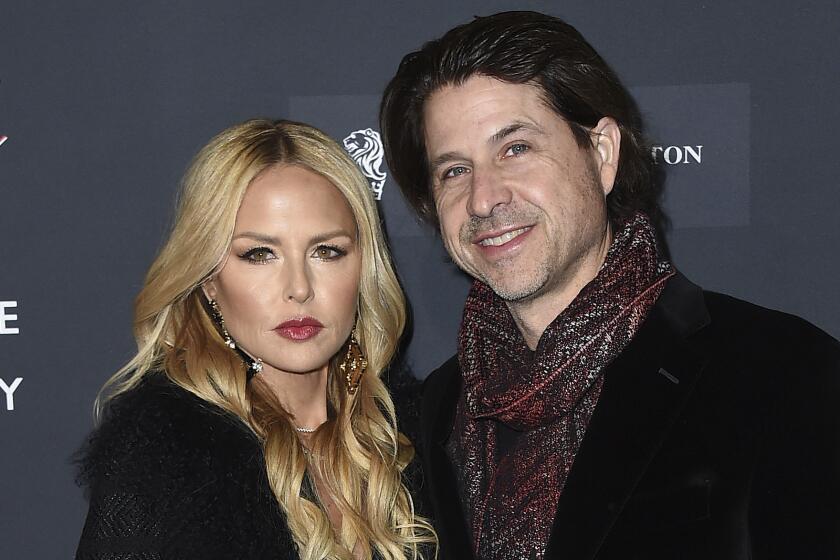Column: Corporations are not people too. Seriously, don’t kid yourself

Corporations are not people too. They care first and foremost about making money (not that there’s anything wrong with that).
But perhaps I spoke too soon when I said recently that the notion of “corporate values” is little more than propaganda.
A report out this week from the consulting firm Accenture found that nearly two-thirds of about 30,000 consumers surveyed said they want companies “to take a stand on current and broadly relevant issues such as sustainability, transparency and fair employment practices.”
It also said almost half of consumers say they’d stop doing business, at least temporarily, with any brand that comes up short in the values department, and 17% say they’d never buy from such companies ever again.
Accenture shared with me numbers for Los Angeles that largely mirror the national trends. Sixty-one percent of local residents want companies to take stands on key issues. Fifty-three percent would walk away at least for a spell from any business that isn’t woke.
Clearly you want to take such findings with a grain of salt.
It’s easy for people to adopt high-minded positions when filling out a survey form. History shows that, in practice, consumers are highly monogamous and will remain loyal to specific brands under almost all circumstances.
Two words: Nike. Sweatshops.
Nike’s alleged use of overseas sweatshop factories to produce shoes and clothing since the 1990s would have been a death blow for a lesser manufacturer. (The company says it strives to safeguard workers, although renewed allegations of sweatshop conditions were made as recently as 2017.)
Yet, for all its image challenges, Nike maintained its standing as the world’s most valuable apparel company this year, according to market researcher Brand Finance. Retailer H&M was a distant second.
I wrote recently about a report from PR firm FleishmanHillard saying that companies must navigate “an issues-laden environment that quickly tests corporate values.”
A spokeswoman for the firm told me that “consumers are saying that they want companies to have positions” on issues such as sexual harassment, ethnic diversity, racism and gender discrimination.
I expressed doubt that businesses care about much of anything beyond increasing sales and keeping shareholders happy.
If they can generate some positive spin through social programs or charitable activities, great. But for-profit companies are not, and never will be, philanthropic enterprises.
This week’s Accenture report said things are changing.
“Up until recently,” it said, “a brand belonged to the company that invested in shaping, growing and monetizing it. This is no longer the case and brands are now community property belonging to shareholders, employees and customers.”
It cited a buzzword that’s increasingly common in corporate circles: authenticity. That is, consumers perceive a brand to be “authentic” if it reflects shared values.
“Consumers don’t fall for insincere attempts to pull at heartstrings,” the report said. “They do, however, reward authenticity, strong leadership and outspokenness.”
Bill Theofilou, an Accenture senior managing director, told me that, thanks to social media, consumers catch on real quick if a company merely pays lip service to doing the right thing.
“We live in a period of digital transparency that has never existed before,” he said.
Theofilou also said consumers now feel entitled to make their feelings known to companies and aren’t shy about voting with their feet.
“We’re seeing a major shift in how consumers are spending their money and what role they want brands to play in their lives,” he said.
I’ll concede it’s increasingly important to consumers that businesses make a seemingly sincere effort to be upstanding citizens. Smart companies are responding to this trend with efforts to demonstrate that their hearts are in the right place.
But let’s not kid ourselves. Most large corporations don’t have the luxury of being guided by touchy-feely values. They have quarterly numbers to hit and competitive markets to navigate.
The U.S. Supreme Court may have bestowed “personhood” on corporations, granting them constitutional rights, but the Founding Fathers knew from the get-go that corporations weren’t our friends.
As James Madison declared in 1827: “Incorporated companies with proper limitations and guards may, in particular cases, be useful; but they are at best a necessary evil only.”
Corporations are not people too. We just want them to be.
At best, and primarily for bottom-line reasons, that desire is perhaps being heard.
Name change
The business-friendly Trump administration is making the Consumer Financial Protection Bureau a corporate watchdog in name only. And for no better reason than because it can, the administration is changing the agency’s name to the Bureau of Consumer Financial Protection.
It turns out that may not be as friendly to business as the White House intended.
The name change could cost companies overseen by the CFPB more than $300 million in bureaucratic expenses, according to an internal agency analysis obtained by the Hill. It estimates that financial firms would have to spend millions updating their paperwork, regulatory filings and databases.
Taxpayers also would get a kick in the teeth. They’d be stuck with a bill for as much $19 million to cover the CFPB’s own cosmetic changes, such as forms, website and signage.
Mick Mulvaney, the CFPB’s acting director, said in a statement that “the bureau does not comment on such internal deliberations.” He added that the “cost to date of adherence to the statutory name has been negligible,” although that doesn’t address the cost of a name change.
Mulvaney has said he just wants to be consistent with the 2010 law that created the agency. It refers to a Bureau of Consumer Financial Protection. However, the agency has called itself the Consumer Financial Protection Bureau since Day One.
It appears the Trump administration is changing the name solely as a way of once again sticking it to former President Obama, who championed creation of a new consumer watchdog.
As I reported Tuesday, Trump has appointed a White House budget official with no experience in consumer affairs or financial regulation to take over as full-time director of the CFPB. Consumer advocates say Kathy Kraninger is completely unqualified for the job. She was approved by Senate Republicans on Thursday.
That’s another way Trump is sticking it to his predecessor. And to consumers.
David Lazarus’ column runs Tuesdays and Fridays. He also can be seen daily on KTLA-TV Channel 5 and followed on Twitter @Davidlaz. Send your tips or feedback to david.lazarus@latimes.com.
More to Read
Inside the business of entertainment
The Wide Shot brings you news, analysis and insights on everything from streaming wars to production — and what it all means for the future.
You may occasionally receive promotional content from the Los Angeles Times.










